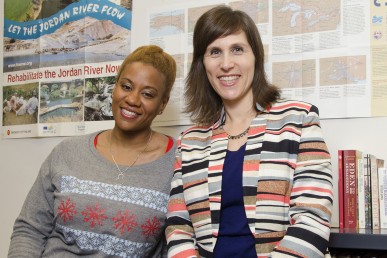UIC scholar leads ‘lab’ for humanities work on Great Lakes issues

Kellen Marshall, UIC Ph.D. candidate in ecology and evolution in the department of biological sciences, and Rachel Havrelock, UIC associate professor of English and Jewish studies. Photo: Joshua Clark (click for larger image)
A University of Illinois at Chicago humanities scholar will lead a multi-site policy “lab” that links three Midwest universities in work that explores social and human issues related to water, energy and natural resources in the Great Lakes region.
The Freshwater Lab is supported by a $75,000 Global Midwest grant from the Humanities Without Walls consortium, based at the Illinois Program for Research in the Humanities at the University of Illinois at Urbana-Champaign. The 15-member consortium, which includes the UIC Institute for the Humanities, is funded by a grant from the Andrew W. Mellon Foundation.
The project’s principal investigator Rachel Havrelock, UIC associate professor of English and Jewish studies, will team with researchers at the University of Michigan and Michigan State University to concurrently promote humanities and social science research on the history, policy and politics of Great Lakes resource distribution and prepare students for work on public policy recommendations and initiatives.
Havrelock has studied transnational water policy and is the author of a 2011 book, “River Jordan: The Mythology of a Dividing Line.” She says the Freshwater Lab aims to supplement and help articulate scientific findings to the public.
“With algae blooms compromising Lake Erie; Detroit residents at risk of losing water service; Chicago running almost entirely on heavy Alberta tar sands oil; tar sand and fracked-gas pipelines surrounding the shores of the lakes; and drought stricken regions near and far looking to Midwestern water stores — it is a necessary moment for a humanistic and social science-based approach to water issues,” Havrelock said.
The lab will host conferences, working groups and courses that explore creative approaches to the social, economic and political issues of water management in the Great Lakes region.
“This lab is centered in Chicago, where UIC, governmental offices and a range of organizations easily intersect,” she said. “We’re trying to make this lab where Chicago, the region and UIC are seamless.”
Havrelock will collaborate with UIC doctoral student Kellen Marshall, who has been researching the impact of pollution on Chicago urban agriculture. Later this year, they will begin a research project examining transnational systems of water and energy sharing between the United States and Canada.
Next year, Havrelock will lead a course in which students will visit research sites, meet with public and corporate officials and develop policy papers, media campaigns, videos, an art exhibit or community-based restoration projects.
“It will be a humanities-driven take on how our resources might be used, managed, allocated, polluted and thought about in the future,” she said.
The lab will launch following a summit at UIC, “Water After Borders: Global Stakes, Local Politics,” that will bring together government officials, non-governmental organization leaders, researchers and students from the U.S., Canada and the Middle East to discuss trans-border water systems, with an emphasis on the Great Lakes and Jordan River.
The summit, sponsored by the UIC Institute for the Humanities and the Institute for Environmental Science and Policy, is funded through the first Global Midwest competition from Humanities Without Walls.
Two UIC researchers are collaborating on other projects funded by Global Midwest grants from Humanities Without Walls: Kim Potowski, associate professor of Hispanic linguistics and director of the Spanish Heritage Language Program, is working with the Midwest Heritage Language Network, and Elise Archias, assistant professor of art and art history, is working on “There There: A Journal of Global Contemporary Art in the Midwest.”
